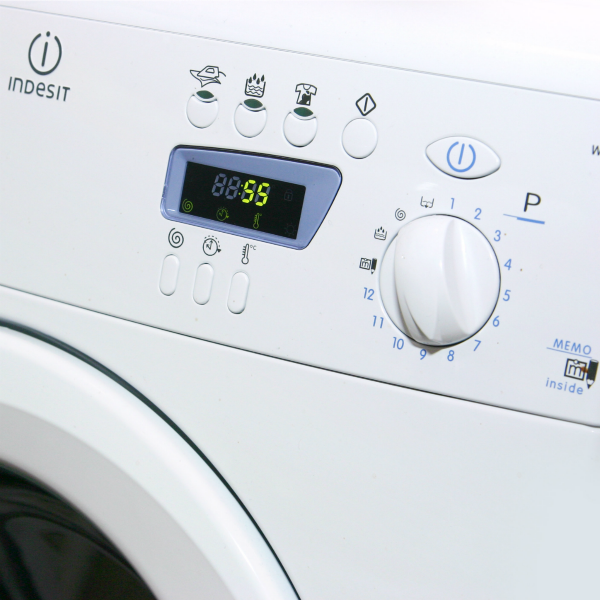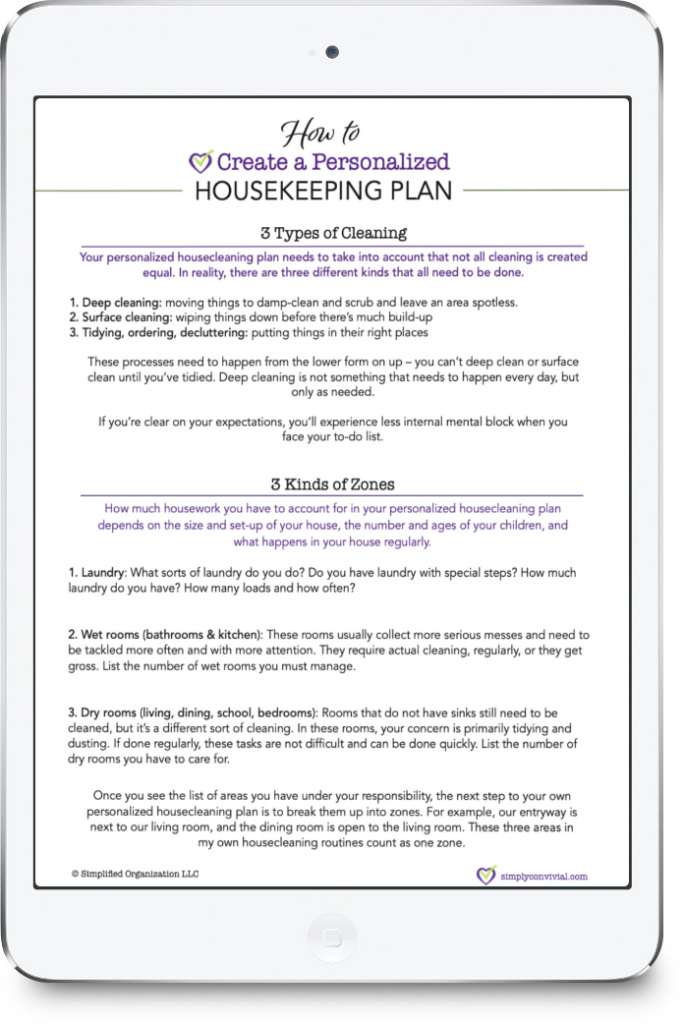
Before you were married or had kids, did you think homemaking would be an easy gig?
I mean, dishes, laundry, sweeping, meals – it seems pretty basic.
But it doesn’t take long for reality to sink in.
I often hear from women who say they were organized when they worked in an office, but they just can’t manage to be – or at least feel – organized at home.
What makes it so hard to stay on top of basic tasks? Why is organization so hard to maintain?
I think it’s due to both the open-ended and repetitive nature of the job.
There are no bosses, no managers, no teachers. There are no paychecks, no grades, no due dates.
The tasks, once done, need to be done again, so there’s never the accomplished feeling of finishing.
We have to not only make our own plan, but also be the one to follow through on the plan without oversight.
Some of us are good at making the plan, but bad at follow-through. Some can follow a task list, but are less comfortable making that list themselves.
So homemaking ends up being a challenging position.
However, like entrepreneurship, it also offers a unique opportunity to shine, to grow in capacity, and to find fulfillment and satisfaction.
In fact, what once caused frustration and resentment can become something in which we find joy and glory.
We must begin by accepting the reality of being a homemaker: of being self-directed, self-employed, and self-motivated.
Without these three facets, we will flounder and fail.

As homemakers, we are self-directed.
If we have no experience in being self-directed, this will initially be a challenge. We won’t thrive in our role and we won’t know exactly why.
Between parents, teachers, and bosses, most of us have always been prodded along to do what we ought.
On our own at home, we wonder why we stumble when the prods are removed.
Instead of looking for new goads to good work: fear, artificial rewards, or someone else’s lists, we need to glory in the liberty of our position. Liberty is not license to do whatever we please; it is the ability to do what is right without hindrance.
When we do what we should not because someone else has made us, but because we have freely chosen it, we mature and grow in new ways. Accept it. Revel in it. Dig in.
The dictionary defines self-directed as “under one’s own control” and “showing initiative with the ability to organize oneself.”
Becoming self-directed takes practice. You cannot wake up tomorrow morning, suddenly self-directed.
However, we can take baby steps and grow in our ability to be self-directed. We can choose a single habit, a single small goal, follow through, and repeat.
As homemakers, we are self-employed.
Someone who owns his own business is in charge of casting the vision, creating the product or performing the service, and also doing the administrative paperwork.
So we, too, as homemakers are in charge of determining our vision and goals, doing the work, and also keeping up with the paperwork and planning that supports both.
It can feel crazy-making because there really are three distinct hats to wear, and we often don’t realize that we need to switch gears to do different types of work.
Set aside time for planning, where you can think about the big picture: what really needs to be done, what are your priorities? Don’t interrupt that time with menial tasks. Sit with pen and paper, brain dump, prioritize, and plan.
Set aside time for administrative upkeep. Pay the bills, answer the letters, organize the coupons, make the grocery list, add entries in the budget. These are not really planning tasks; these are the little organization tasks that make life run smoothly.
When you have time blocked off for the planning and for the upkeep, then you can spend the bulk of your time in doing mode without that nagging feeling that there’s something you should be attending to that you’ve forgotten.
Related: Know your vocations.
As homemakers, we must be self-motivated.
If we aren’t self-motivated, we will either be unmotivated or fear-motivated – both unhealthy options.
So where does self-motivation come from? Where do we get it?
A little reward can be a useful motivator at times: “After I put away the laundry, I will have a cup of coffee.” or “After I clean up the kitchen, then I will read my novel.”
But when we try to attach material, external rewards to the larger scope of our work, it usually fails. It’s not true motivation and won’t stick when the going gets tough.
Weight loss is similar. We might say that our reward for reaching our goal weight will be a new pair of jeans. However, if we tear, stain, or lose all our jeans, will we really withhold a new pair until we lose the weight? No. If we find a great deal on a pair we like, will we wait? Probably not. Will the vision of a new pair of jeans be strong enough to overcome the temptation of the chocolate at 9pm? Not at all.
If we want to reach the goal, we have to have clear reasons for wanting it in the first place, and we have to keep them top of mind.
In the case of weight, we need to focus on being healthy and having enough energy to keep up with the kids. Anything else is too superficial to last us through temptation. In the case of housework, we need to focus on having a house that helps instead of hinders our lifestyle and our goals.
We need intrinsic motivation – deep, honest motivation – rather than external, superficial motivation.
We need to know our why and we need to keep front and center, every day.
Homemaking is not an easy gig, but it is a worthwhile one.
Let’s dig in.


And then there’s the fact that – especially in the early years – we are trying to do the work while also pregnant, nursing, or sleep-deprived… Or some combination thereof! I think trying to maintain consistency and direction while dealing with so many physical discomforts and ills really makes everything so much harder.
Perhaps this is weighing rather heavily on my mind since I’m sitting here, groggy, uncomfortable and 29 weeks pregnant ? But at least I now have a 15 yo who can do the breakfast dishes and an 11 yo who can put away all the food and clean the counters!
That is so true, Amber! It really hit me hardest while pregnant with my third and fourth, when the other kids being able to put on their own shoes was a huge helpful step!